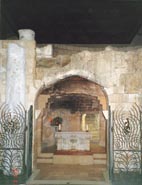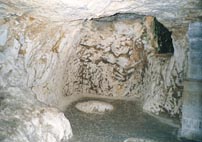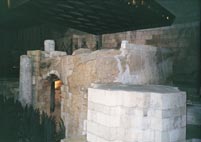 |
Memor Domini. The memory of the Lord, the awareness that keeps present the meaning of everything we do, if it is preordained–if the frequency of this memory is preordained–it is the entire human structure that is struck, the human structure of the individual, of every person who accepts to live the world according to this.
Memores Domini. But each of us would lose this memory completely–we already lose it in so many moments, so many days, so many circumstances of our existence–each of us would no longer be a Memor Domini, could no longer be Memor Domini in the concrete meaning of the term, if he did not have, somewhere, a locus where the original source and wellspring that has gushed forth in his heart–stripping bare his life, his inner life, stripping his life above all in its most intimate aspect–reoccurs as self-awareness, as awareness of things. There would not be this newness in the world if we could not point to a place where this new awareness is awakened, reawakened, pursued as a continuous clarification; if there were not a point, an apartment, a piece of land on which to build, where one can build; if there were not a house.
Man is born, and there is a place where this happened: a place, because the Lord clarified all of this by being born in Bethlehem. How important this birth in Bethlehem is for the Lord, that stable–or that place, whatever it is–where Mary gave birth!
The word “house” indicates all this. There can be no Memor Domini except between these walls: our life must be with others who have been shaken in the same way, who have been led here just as they are and embraced just as they are. There could be no Memores Domini if they did not find their habitat in the house, that is to say, the place where they can recharge their energy every day. This is because we would fall, we always tend to fall into nothingness, to conceive of life as a path toward the nothingness of all of ourselves, or to emphasize and keep ever before our eyes (as we lead our lives piece by piece) what at the moment suits us and we like, what most suits us and we like most.
The house. It is in the house that we also see, that we have the insight that the Memor Domini is someone within a crowd of people like these who have been touched by the thought of the Savior.
Memores Domini. There cannot be, then–after everything we have said above–Memores Domini without the liveliness, without each of the Memores Domini, each one, having said “yes” to the Lord.
Memores Domini. The memory of Christ creates a people, a new people with their own laws, with a suitable climate in which everything tends to become the glory of God, that is to say, the glory of how God manifested Himself to man, because we cannot discuss God, after He manifested Himself, without looking at the way He is present, without considering how He manifested Himself. My wish for you is that at the end of your life the Lord may thank you for having said “yes” to His proposal. God’s proposal is made up of Himself and the way in which He has made the whole world aware of Him.
And we know that this also saves mankind. It saves! It fuels the presence of the sun every day for all of mankind. Since the moment when there were twelve, when there were only twelve, from just a few men, such few men, all of mankind–in space and in time–all of mankind has been struck by something that has made it possible for men to know themselves and the heavy pondus of living together.
Thus my wish for you is that,–in this situation where you are now, because you are “professed” (professed!),–you may have the strength and the courage–but never mind strength and courage–that you may have the simplicity, the simplicity of heart of a child who never has any prejudices in his relationships with things, with persons and things, with everything around him.
May you all, just as the Lord gives me the possibility of saying this to you, my heartfelt wish for you all is that you may all be Memores Domini!
With this we end the year, a year, a year of life. And we speak of the glory of Christ, the glory of Christ, a Man in history: we speak of the meaning of history centered on Christ.
At the end of a year, may the Spirit re-create your hearts, may He re-create our hearts, before the end of time and the annihilation in space of our corporeality strikes us as judgment.
God’s mercy does not suppress, does not diminish, does not make equivocal the event that all people, the reason of all people understand, fearing–the contrary is true for we who love You, oh Christ; we even desire it–the last judgment, the conclusive judgment that God makes about our lives.

